Lesson Plan: Busy, not Bored
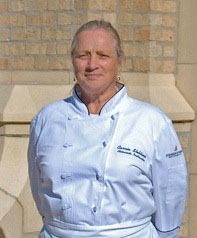 Rotating groups through learning modules keeps students engaged while enhancing their skills development.
Rotating groups through learning modules keeps students engaged while enhancing their skills development.
By Carrie Stebbins, CWE
If you teach practical lab classes and have not yet tried a lesson plan where you have students rotate through a number of modules, each teaching a specific skill, I encourage you to try!
This works especially well early in a class when you have several fundamental skills you want your students to practice. With a lab class of 20 students, I plan four modules with five students in each group. I give each of the groups a mise-en-place list.

 Coors Recycles® teams up with Recyclebank® to reward consumers for their environmental efforts.
Coors Recycles® teams up with Recyclebank® to reward consumers for their environmental efforts. Highly accomplished chef, restaurateur and author Waldy Malouf has a new mission. After a successful 13-year run as co-owner and chief operating officer of Beacon in New York City, Malouf became the senior director of special projects at The Culinary Institute of America (CIA) in Hyde Park, N.Y., on January 21, 2013.
Highly accomplished chef, restaurateur and author Waldy Malouf has a new mission. After a successful 13-year run as co-owner and chief operating officer of Beacon in New York City, Malouf became the senior director of special projects at The Culinary Institute of America (CIA) in Hyde Park, N.Y., on January 21, 2013.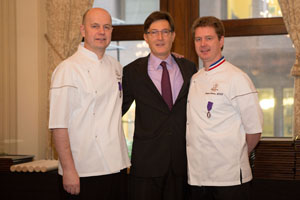 As the city’s financial district bustled through its morning rush hour outside of the historic Union League Club of Chicago, inside, 98 students of The French Pastry School of Kennedy-King College at City Colleges of Chicago took the first steps toward beginning their new vocation. Graduates of the full-time programs, L’Art de la Pâtisserie and L’Art du Gâteau, celebrated their commencement on the same day that the school received one of the highest honors that educators can be given by the French government: Ordre des Palmes Academiques (Order of Academic Palms), a recognition that was instituted by Napoleon to award “teaching and the development of knowledge.”
As the city’s financial district bustled through its morning rush hour outside of the historic Union League Club of Chicago, inside, 98 students of The French Pastry School of Kennedy-King College at City Colleges of Chicago took the first steps toward beginning their new vocation. Graduates of the full-time programs, L’Art de la Pâtisserie and L’Art du Gâteau, celebrated their commencement on the same day that the school received one of the highest honors that educators can be given by the French government: Ordre des Palmes Academiques (Order of Academic Palms), a recognition that was instituted by Napoleon to award “teaching and the development of knowledge.”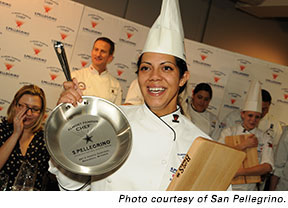 On Jan. 14, Sullivan University student Kamisha Jones won first place at the S.Pellegrino
On Jan. 14, Sullivan University student Kamisha Jones won first place at the S.Pellegrino 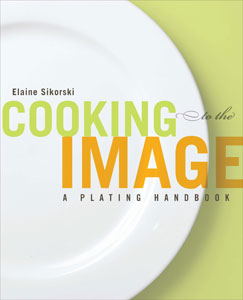 Chef Elaine Sikorski, CEC, CCE, an instructor at Kendall College School of Culinary Arts, is the author of the recently published
Chef Elaine Sikorski, CEC, CCE, an instructor at Kendall College School of Culinary Arts, is the author of the recently published 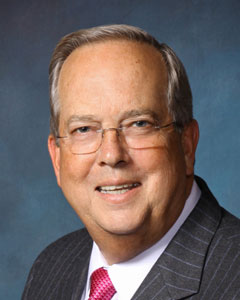 Club Managers Association of America (CMAA) CEO James B. Singerling, CCM, on Jan. 16 announced his intention to retire in 2015, completing 25 years of service. The early timing of the announcement is consistent with the terms of Singerling’s contract and will allow him to assist in the transition to a new CEO by his retirement date.
Club Managers Association of America (CMAA) CEO James B. Singerling, CCM, on Jan. 16 announced his intention to retire in 2015, completing 25 years of service. The early timing of the announcement is consistent with the terms of Singerling’s contract and will allow him to assist in the transition to a new CEO by his retirement date.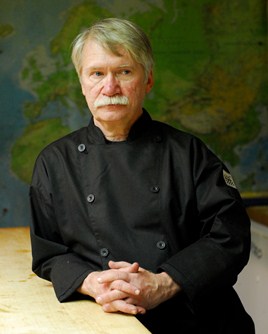 Almost 25% of the motor cortex of the human brain is dedicated to the hands. Yet as chefs, says this former president of a prestigious culinary school, we take better care of our knives.
Almost 25% of the motor cortex of the human brain is dedicated to the hands. Yet as chefs, says this former president of a prestigious culinary school, we take better care of our knives.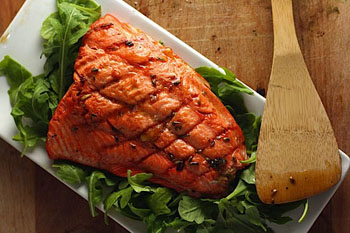 It and 10 others join The Food Channel’s 2013 Trends Forecast. Smoked water, anyone? And “no choice” is becoming the new choice when dining out.
It and 10 others join The Food Channel’s 2013 Trends Forecast. Smoked water, anyone? And “no choice” is becoming the new choice when dining out.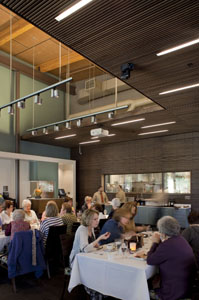 Cascade Culinary Institute builds a new culinary center whose physical and spatial attributes meld perfectly with its natural surroundings, facilitating student learning and the successful collaboration of education and community.
Cascade Culinary Institute builds a new culinary center whose physical and spatial attributes meld perfectly with its natural surroundings, facilitating student learning and the successful collaboration of education and community.